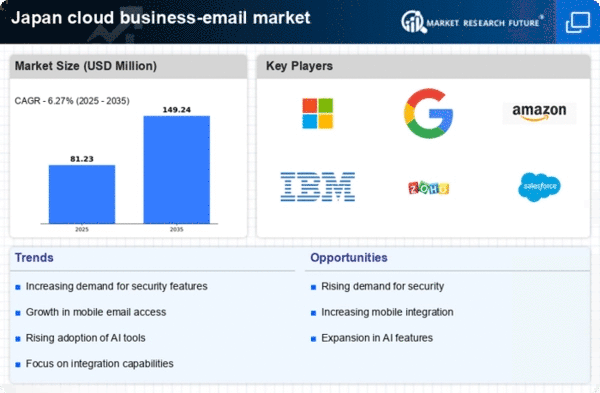Competitive Pricing Strategies
In the cloud business-email market, competitive pricing strategies play a crucial role in attracting customers. As the market matures, providers are increasingly offering tiered pricing models to cater to businesses of varying sizes and budgets. In 2025, it is anticipated that around 50% of companies will prioritize cost-effectiveness when selecting email solutions. This trend compels providers to balance affordability with quality, ensuring that their offerings remain attractive in a crowded marketplace. As a result, the cloud business-email market is likely to witness a shift towards more flexible pricing structures, enabling businesses to choose plans that align with their specific needs and financial constraints.
Integration with Emerging Technologies
The cloud business-email market in Japan is increasingly influenced by the integration of emerging technologies. As businesses seek to enhance operational efficiency, the incorporation of tools such as artificial intelligence and machine learning into email services is becoming more prevalent. These technologies can automate routine tasks, improve email sorting, and enhance security measures. By 2025, it is projected that 40% of cloud business-email solutions will incorporate AI-driven features, allowing organizations to streamline their communication processes. This integration not only improves user experience but also positions providers as leaders in innovation within the cloud business-email market.
Rising Demand for Remote Work Solutions
The cloud business-email market in Japan experiences a notable surge in demand for remote work solutions. As organizations increasingly adopt flexible work arrangements, the necessity for reliable and secure email services becomes paramount. In 2025, approximately 70% of Japanese companies are expected to implement remote work policies, driving the need for cloud-based email solutions that facilitate seamless communication. This shift not only enhances productivity but also necessitates robust security measures to protect sensitive information. Consequently, providers in the cloud business-email market are likely to innovate and expand their offerings to meet these evolving demands, ensuring that businesses can operate efficiently regardless of location.
Regulatory Compliance and Data Protection
In Japan, stringent regulations regarding data protection and privacy significantly influence the cloud business-email market. The Personal Information Protection Act (PIPA) mandates that organizations safeguard personal data, compelling businesses to adopt cloud email solutions that comply with these regulations. As of 2025, it is estimated that 60% of companies prioritize compliance when selecting email services. This focus on regulatory adherence drives demand for cloud business-email solutions that offer advanced security features, such as encryption and data loss prevention. Providers that can demonstrate compliance with local laws are likely to gain a competitive edge in the market, appealing to businesses concerned about legal ramifications.
Growing Importance of Mobile Accessibility
The increasing reliance on mobile devices for business communication is reshaping the cloud business-email market in Japan. With over 80% of professionals using smartphones for work-related tasks, the demand for mobile-friendly email solutions is on the rise. This trend necessitates that cloud business-email providers optimize their platforms for mobile access, ensuring that users can manage their emails efficiently on the go. As mobile accessibility becomes a critical factor in user satisfaction, companies that fail to adapt may struggle to retain customers. Thus, the cloud business-email market is likely to see innovations aimed at enhancing mobile functionality, catering to the needs of a mobile workforce.
















